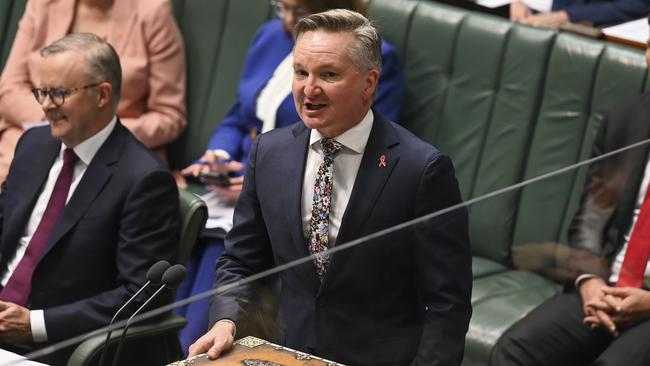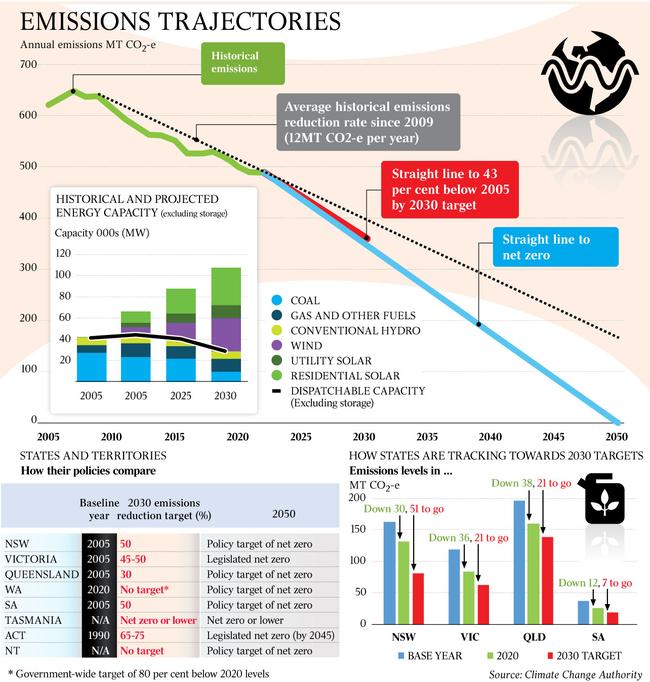Labor’s 2030 emissions target will take ‘substantial effort’
Australia is on track to fall short of its commitment under the Paris Agreement to reduce carbon emissions by 43 per cent by 2030.

Australia is on track to fall short of its commitment under the Paris Agreement to reduce carbon emissions by 43 per cent by 2030, with the Albanese government needing to unveil new climate change policies to meet the targets it took to the election and legislated in parliament.
In his first annual climate change statement delivered to parliament, Energy Minister Chris Bowen said the federal government’s Climate Change Authority was projecting Australia’s emissions would be 40 per cent lower than 2005 levels by 2030.
This is much better than the 30 per cent projected under the policies of the former government but below the target Labor committed Australia to internationally.
The Climate Change Authority also said Labor’s promise to have 82 per cent of electricity come from renewables by 2030 – the key plank of meeting its target – was at risk from supply chain disruptions, long approval times for major projects and workforce shortages.
With the government being pushed by the Greens and environmental groups to increase its 2030 target, Mr Bowen said the projections showed reaching the 43 per cent commitment would take a “substantial effort”.
Mr Bowen said ahead of the election the 43 per cent target was based on the policies Labor had adopted before the Powering Australia plan was released late last year.
The Climate Change Authority report said Labor’s existing policies would not be enough to reach the 2030 target, putting the government agency at odds with Mr Bowen’s pre-election modelling undertaken by RepuTex.

“The government will need to deliver on its Powering Australia plan and more if Australia’s targets and commitments are to be met,” the report said.
Mr Bowen said he believed the government could exceed its 43 per cent target if it implemented policies it “had a mandate for”, including reforms to the safeguard mechanism and a roadmap to encourage the uptake of electric vehicles.
“The documents I am tabling today, including the advice from the Climate Change Authority, underline just what a substantial effort this 43 per cent target requires,” he told parliament. “The previous government left their projected emissions reductions by 2030 at only 30 per cent.
“The projections … show the actions and policies of this government so far have increased this to a projected 40 per cent. That is, we’ve lifted the outlook by a third in just our first six months. Policies we received a mandate for, and are working on implementing, will lift our result to at least 43 per cent.”
Mr Bowen said the Climate Change Authority had advised that to achieve the 43 per cent target, “we will need to achieve the same emissions reduction in the next eight years that has been achieved in the last 18”.
“Since 2009, Australia has decarbonised its economy at an average annual rate of 12 million tonnes of carbon a year,” he said.
“To achieve a 43 per cent reduction by 2030, and net zero by 2050, this decarbonisation rate needs to be at least 17 million tonnes of carbon a year – a 40 per cent increase.”
The report said there were challenges in meeting the 2030 target because of supply chain issue and labour shortages.
“The technologies for meeting the 2030 target exist, but the scale and speed of the task demand close attention to barriers like supply chain disruption, labour skills shortages, and long lead times in planning and approval of major projects,” it said. “Large-scale renewable generation needs to be deployed at two to three times the rate of the previous decade, with accompanying energy storage, to get to 83 per cent renewables by 2030.”





To join the conversation, please log in. Don't have an account? Register
Join the conversation, you are commenting as Logout